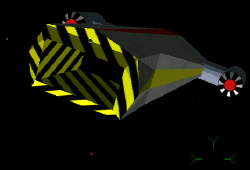Deep Space Dredger
| Deep Space Dredger | |
|---|---|

| |
| Size (metres, W×H×L) | 690 × 180 × 880 |
| Cargo capacity | 500 TC |
| Cargo bay extension | N/A |
| Maximum speed | 0.10 LM |
| Manoeuvrability | Roll: 0.1 Pitch: 0.1 |
| Energy banks | 31 |
| Energy recharge rate | excellent (20.0) |
| Gun mounts | 2 ball turrets |
| Missile slots | 0 |
| Shield boosters available | No |
| Military shields available | No |
| Hyperspace capable | No |
| OXP or standard | OXP |
| Available to player | No |
| Base price | N/A |
Author: Sabre
Overview
Space Dredgers operate mainly in deep space, scooping up wreckage, hydrogen and space dust for later processing. Space Dredgers are occasionally encountered in the border of the space lanes. Commanders choosing to dock with a Dredger can take advantage of its well equipped shipyard or the chance to trade. Attacking a Dredger is unwise, as it is well defended by a squadron of Sabre fighters. The Dredger is not available to the player, although second hand Sabre fighters are occasionally available on the open market.
How to dock
Docking problems are similar to the ones encountered with the Behemoth: you are trying to dock with a non-stationary object. Don't forget that the Dredger will occasionally execute a 180 degrees somersault to avoid collisions, during which docking seems quite impossible. For docking force it to a halt with the docking computer. After this you can cancel the automatic docking and do it manually.
Starting with Oolite 1.74 most carriers will react on a docking request by pressing shift-L.
Salvaging
With version 2.0 the dredgers have stepped into the salvage business. In level 9 and higher systems special salvage drones are offered to a clean player. These drones are released as missiles. When fired at a derelict ship, it tries to penetrate the outer hull and will connect to the main computer. In 90% of the cases, an abandoned ship is still intact and the drone will try to contact a nearby dredger. When a dredger is found, the drone will instruct the auto pilot to fly to the dredger and dock with it. Pay-out is based on the ships mass and cargo. Small ships are probably not worth salvaging but big ships give a high pay-out. Just be aware that the drone can only handle ships that fit through the docking slid of a dredger. It can't control a really big ship, but an anaconda is salvageable.
The derelict may find pirates on his way that try to destroy the ship to obtain its cargo. A ship flying on autopilot can't defend itself, so it is up to the salvager to protect the derelicts voyage. When the derelict ship docks save with a dredger an amount of money is transferred to the salvager, based on the ships mass and the cargo load.
Download
Download Deep Space Dredger 1.2 OXP (for Oolite 1.65+)
or
Download Deep Space Dredger 2.2.8 OXP (size 2.1 MB, for Oolite 1.72+)
or
Download Deep Space Dredger 2.3.1 OXP (size 11.1 MB, for Oolite 1.73+. Has much more detailed texture than v 2.2.7)
or
Download Deep Space Dredger 2.4.4 OXP (size 19.8 MB, for Oolite 1.73+. It needs a computer with shaders capability)
Version requirement
Deep Space Dredger 1.2 needs minimum Oolite 1.65. For additions in deep space it needs Oolite 1.71+
Version 2.0 or higher has three additional dredger models and some extra functions.
History
version 2.4.3: Fixed a casing bug in the JS system that will generate bugs after Oolite 1.74.2 (Also fixed this bug in the smaller packages v 2.2.8 and v 2.3.1)
version 2.4.0: All ships have now have normal maps (By Captain Berf). Normal maps simulate a surface relief on textures. You need a computer with shader capability or you will see no difference with v 2.3
version 2.3.0: All ships have new textures (By Captain Berf). The two biggest ships now also have bigger docking bays. Raised minimum Oolite version to 1.73.
version 2.2.7: Bugfix of 2.2.7.
version 2.2.6: Added more variation in the chosen derelicts. (Contains a serious bug, please update immediately)
version 2.2.5: In previous versions the "special" price-list for commodities was never used.